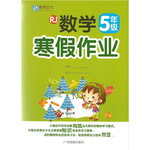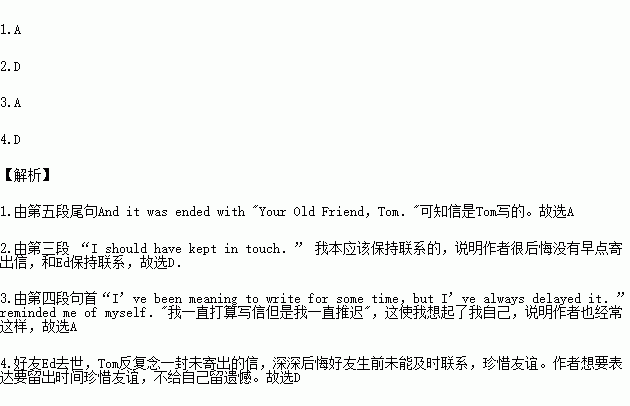题目内容
阅读下列短文,从每题所给的A、B、C、D四个选项中,选出最佳选项。
I had to knock on the taxi to get his attention. Finally, the driver, a man about 60,looked up from behind the wheel and apologized,“I’m sorry, but I was reading a letter.” He sounded as if he had a cold or a cough.
Since I was in no hurry, I told him to finish his letter. He shook his head, explaining that he had already read it several times and almost knew it by heart. Curious, I asked whether it was from a child or maybe a grandchild. “This isn’t family,”he replied. “though he might just as well have been a regular member of the family. Old Edand I grew up together.”
They were always friends. But since he moved away from the neighborhood 30 years ago, it’d generally just been postcards at Christmas time between them. A couple of weeks ago, Ed died. “I should have kept in touch.” He repeated this, more to himself than to me. To comfort him, I said sometimes we just didn’t seem to find the time.“But we used to find the time,” he said. “Take a look.” He handed the letter over to me.
The first sentence “I’ve been meaning to write for some time, but I’ve always delayed it.” reminded me of myself. It went on to say that he often thought about the good times they had had together. When I read the part where it said “Your friendship really means a lot to me, more than I can say because I’m not good at saying things like that”,I found myself nodding in agreement.
We had gone several kilometers and were almost at my hotel, so I read the last paragraph: “So I thought you’d like to know that I was thinking of you.” And it was ended with “Your Old Friend, Tom.”
“I thought your friend’s name was Ed,” I said.
“I’m Tom,” he explained. “It’s a letter I wrote to Ed before I knew he’d died. I never put it in the mailbox. I guess I should have written it sooner.” His face was pale as he wiped his eyes with a handkerchief.
When I got to my hotel room I didn’t unpack right away. I had to write a letter and post it.
1.Who wrote the letter?
A. Tom
B. Old ED.
C. The author.
D. The driver’s grandchild.
2.It can be inferred from the passage that the driver regretted_____.
A. missing Ed’s funeral
B. moving away from his neighborhood
C. forgetting to send Ed Christmas cards
D. not being able to keep in touch with Ed
3.From Paragraph 4,we learn that the author _______.
A. often fails to write to his friends
B. has no intention to write to his friends
C. had many great moments with his friends
D. was good at expressing his feelings to friends
4.What message does the passage probably try to convey?
A. Comfort your friends when they are feeling down.
B. Life is unpredictable so live each day as if it were your last.
C. Remember to always mail your letters after expressing your words.
D. Always make time to value and experience your lasting friendships.
 黎明文化寒假作业系列答案
黎明文化寒假作业系列答案
